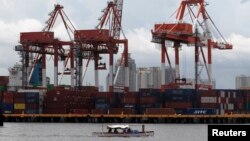A high-level U.N. meeting Friday in Bangkok is expected to address how Southeast Asia’s economic integration will lead to more transnational criminal activity and public security threats.
Southeast Asia’s planned economic integration in the coming years is hoped to boost economic growth by lowering barriers to trade and travel.
But those measures are also expected to allow transnational criminal groups freer reign. The U.N. Office on Drugs and Crime says Asian authorities need to work together better to combat the problem.
A recent UNODC report, which has not been publicly released, warns gaps between "security agencies and economic/transport planners leads to inefficiency and ineffectiveness" at a time Southeast Asia is committed to regional trade integration.
On Friday, senior officials from countries in Southeast Asia and the Pacific region, along with those of several U.N. development agencies, will meet to discuss the problem.
The region's representative for UNODC, Jeremy Douglas, tells VOA the conference will bring together those involved in promoting trade and officials tasked with managing borders and enforcing rule of law.
"We need to bring the thinkers that are involved in both together. We need them to appreciate each other," he adds, "and we need to come up with some practical solutions that are going to help counter transnational crime," he said.
Organized crime in Southeast Asia generates - by conservative accounts, according to UNODC, about $100 billion per year.
Douglas says illicit drug manufacturing and trade in such countries as Afghanistan, Laos, Myanmar, and Pakistan continue to grow and are destabilizing the region.
"We also see the destabilizing effect of other things like human tracking or other types of trafficking where monies generated then get laundered into the legitimate economy. When they get laundered in to the legitimate economy they distort it," Douglas notes, "So basically they hurt the people or the businesses that play by the rules."
The Association of Southeast Asian Nations (ASEAN) has set December, 2015 for achieving an integrated economic community. But the Asian Development Bank and other institutions have cautioned the community will fall short of its goals by the deadline because there are many issues and policies still to be resolved.





